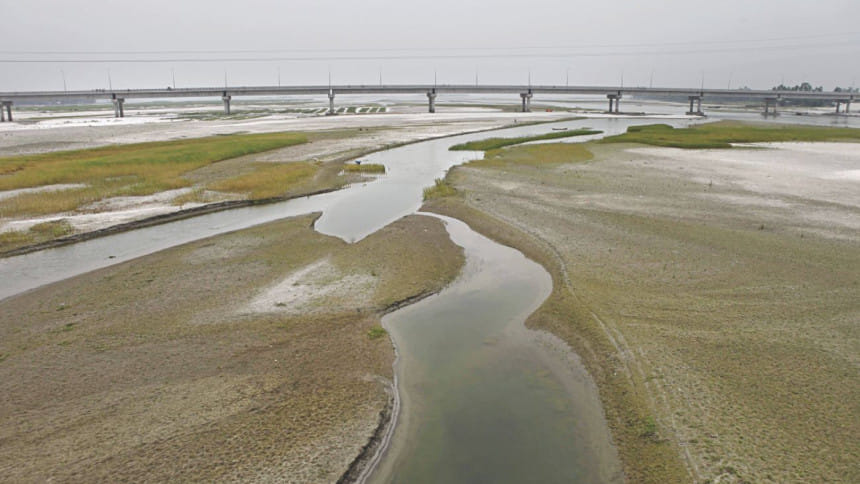Of course Hilsa is not bred in the Teesta

YES, that very mouth watering aquatic creature, which every affluent Bengali will do anything to have a piece on his or her plate as often as possible, finds the Padma a more suitable ground to breed. And Mamata Banerjee wanted to remind our prime minister of this, as if Sheikh Hasina was not aware of this simple fact of ichthyology in our region.
But it could not have been lost upon the mind of such an extraordinary politician of the stature of Mamata Banerjee that behind the veneer of the lighthearted banter of Sheikh Hasina, made in response to the Paschimbanga chief minister's request for more Hilsa fish from Bangladesh, that Hilsa will go upstream if more water of Teesta flows downstream, was the expression of a real concern of the people of Bangladesh—the Teesta and a deal on sharing of its waters,
It is a matter that informs our relations with India to a very large extent. The fact that a likely deal on it was scuttled in 2012 due to the intransigence of the Paschimbanga chief minister is also not lost upon the people of Bangladesh. And I think Sheikh Hasina could not have conveyed our view point on a most vital issue to a very honoured guest of ours, one who can influence the issue in a manner no other Indian politician can, at least to the extent the politics of Paschimbanga would allow, in a more lucid yet assertive manner.
Mamata's visit was of course much awaited and much anticipated insofar as the Teesta water sharing is concerned. Mamata Banerjee must have landed in Dhaka with an eerie feeling at the back of her mind that it was she who had put the spanner in Manmohan's works in 2011 when she chose to drop out from the Indian prime minister's entourage list. Even our very proactive Jamdani and Hilsa diplomacy failed to move Mamata Banerjee. Our foreign minister and advisor of the PM on foreign affairs must have been deeply embarrassed, having been given to understand till the last moment that Teesta deal will go through, as were the people profoundly disappointed when the 2011 visit of Manmohan Singh turned out to be less than substantive for us.
Mamata was here also in the backdrop of several important and sensitive developments in her state that have profound bearing on the security situation of the country. There is the Saradha scam; some of the money from it, allegedly, was siphoned into Bangladesh to fund extremists. Then there is the alleged link of some TMC politicians with proscribed Bangladesh extremist groups and their being provided sanctuary and sustenance in Paschimbanga, and the party's alleged link with Jamaat.
The very composition of the entourage, consisting also of film and cultural personalities popular in both sides of the border, makes it clear that this also was an exercise in PR , and it is about the sensitive issues that she wanted to test the wind in this country. And it is significant that her first programme in Dhaka was meeting with our cultural figures, which helped break the ice.
I must admit that I am not disappointed, and I expect that those who believe that realpoltik and national interest predominate all motivations in the conduct of neighbourly and international relations have not been either, by nothing more than the assurances of the Paschimbangla chief minister to have faith in her in the Teesta issue. I feel that she has realised that Teesta water for Bangladesh is its right and must get its due share, unlike the favours Bangladesh has done to India by giving it access through our territory and use of some river ports, free of cost. And we understand that she would now request New Delhi to proceed for a deal.
But without sounding pessimistic, I feel that there is a long way to go before we get our due share of Teesta water. The Teesta is running dry, but we also know that water is being diverted from it at Gazaldoba by India. We have to brace ourselves for more delay since new studies will involve more time, but no one is sure how much. However, the stumbling block has been removed in that Mamata Banerjee has relented on the issue on both the Teesta and LBA. The Indian prime minister is likely to visit Bangladesh in December. I am sure he will not have agreed to visit Dhaka unless he had something positive to convey to us. However, we will hope that the Teesta deal, once approved, which we hope will be soon, will not suffer from the same fate as the LBA, a wait of more than forty years before being ratified by India, on grounds of technicalities and "further studies.' And read between the lines of Mamata's statement that interest of both countries has to be considered while working out the water sharing modalities.
The writer is Editor, Oped and Defence & Strategic Affairs, The Daily Star.

 For all latest news, follow The Daily Star's Google News channel.
For all latest news, follow The Daily Star's Google News channel. 



Comments